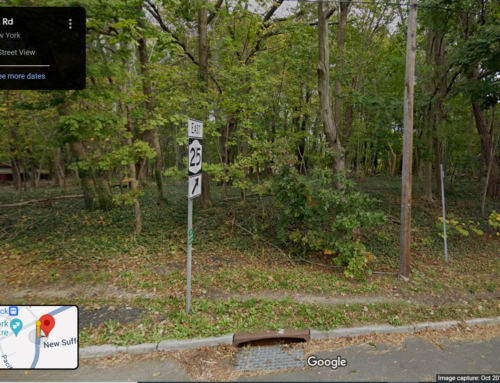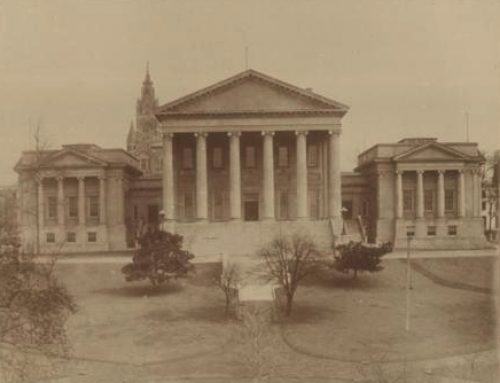United States v. 8.929 Acres, 36 F.4th 240 (4th Cir. 2022)
Discussion of just compensation in eminent domain matters is often so synonymous with fair market value that practitioners can end up thinking that just compensation and fair market value are the same thing. This case illustrates that at least in the federal context, there is some at least a small area where the circles of that Venn diagram do not overlap, in an area called substitute facilities, where the condemnor can instead of providing fair market value as just compensation, build replacement or substitutes facilities for those which were taken. Seems like an interesting concept. In this case, the federal government sought to condemn property owned by Arlington County as part of its efforts to expand Arlington National Cemetery. The property at issue consisted primarily of 3 county-owned roads: Columbia Pike, South Joyce Street, and Southgate Road. The county also owned land adjacent to Southgate Road, some of which was used for parking and some of which was vacant grassland.
Rather than offer monetary compensation, the government offered to construct replacement roads for the county. The county acknowledged that the proposed arrangement would be suitable compensation for Columbia Pike and South Joyce Street but asserted that monetary compensation should be paid for Southgate Road and the Southgate parcel because of the development potential of that property. The government did not agree with that assertion and instituted condemnation proceedings against the property in federal court.
The argument at the trial level boiled down to whether the land being sought was a single functional parcel or multiple parcels. Because substitute facilities are an alternative method of compensation to payment of fair market value and compensation is paid for each parcel, the outcome of this issue would determine whether the County could be paid fair market value for the Southgate parcel. The government claimed that the property constituted one integrated road network and so was a single parcel. The county, by contrast, argued that the Southgate property was a separate parcel that had concrete development potential and was therefore marketable.
Pursuant to Federal Rule of Civil Procedure 71.1, the court determines all issues except for the amount of just compensation in a condemnation proceeding. Early on in the litigation, the government filed a motion pursuant to that rule requesting the court to decide that the purported fair market value of the Southgate property was irrelevant to the litigation because the appropriate measure of compensation was replacement facilities for the roads. The court denied the motion as premature, and the parties proceeded with discovery. Rather than renew that motion at the close of discovery, the government instead moved for summary judgment under Rule 56 on the issue of compensation. The court granted the motion, finding that the taking constituted a single project and that replacement facilities therefore constituted just compensation.
The Fourth Circuit reversed and remanded the case. It first noted that just compensation for a taking is normally measured by the fair market value of the property taken but that replacement facilities can constitute just compensation for property that is more difficult to value, like streets or other public facilities. It then confirmed that replacement facilities are an alternate measure of compensation, meaning that monetary payments cannot be combined with replacement facilities in an award for a parcel. The case therefore depended on whether the property constituted a single parcel or multiple separate parcels. Because the county had presented evidence from which the fact-finder could have concluded that the Southgate property was a separate parcel from the other road parcels and thereby created a genuine issue of material fact, the trial court erred in granting summary judgment in favor of the government.
However, the matter may just be much ado about nothing, because, although the Court could not make that rule under Rule 56, it could have made that ruling under Rule 71.1. Thus, as the concurring opinion from Judge Rushing noted, the “error appears to be one the district court can remedy on remand by applying the correct label to her ruling—that of Rule 71.1, which authorizes district courts to make factual findings, instead of Rule 56, which forbids it.”
Editor’s Note: This case summary was put together with the assistance of our summer associate Virginia Augello.
Mountain Valley Pipeline, LLC v. 4.72 Acres of Land, No. 7:18-cv-00647, 2022 U.S. Dist. LEXIS 56888 (W.D. Va. March 29, 2022)
As part of its efforts to construct an interstate natural gas pipeline in southwest Virginia, Mountain Valley Pipeline sought to condemn a portion of an 80-acre tract in Floyd County. The landowner, in discovery, indicated that he intended to offer his opinion about the value of his property at trial. Specifically, he intended to testify that his property was worth $5 million before the taking and would only be worth $80,000 after the taking. He therefore estimated his just compensation at $4.92 million. His own expert appraiser, meanwhile, estimated that the property was worth $486,000 before the taking and $262,440 after the taking.
To support his opinion, the landowner pointed to sales of unimproved properties in the area that ranged from $120,000 to $1.2 million. The sale with the highest price was for a 39-acre parcel that was unimproved. The landowner stated in his deposition that he thought the price paid for the comparable property was “ridiculous” and that, if the comparable property would sell for $1.2 million, $5 million for his property, which featured, among other things, a horse-riding ring, two barns, a pond and creeks, acreage for hay, a cottage farm home, and “a panoramic view from Poor Mountain to the Blue Ridge Parkway,” would be a reasonable figure. In the after, the landowner claimed that the land would no longer be suitable for residential purposes because of the pipeline, so it could only be used for pastureland. He testified that pastureland sells for about $1,000 per acre in Floyd County.
MVP moved to exclude the landowner’s testimony. The court noted the general presumption that a property owner is competent to testify on the value of his or her own property. However, that testimony must rest on a valid foundation. The rationale for allowing the property owner to offer lay opinion about the value of his or her property is familiarity with or special knowledge about the subject property. The rationale will not support the introduction of testimony that is mere repetition of another person’s assessment of the property value or that is based only in speculation or conjecture.
The court found that the landowner’s opinion here was inadmissible. His opinion that his property was worth more than four times the “ridiculous” price paid for a comparable property was nothing more than conjecture. Specifically, the court found that the landowner’s assertion that some “one-percenter” with unlimited funds would be willing to pay $5 million for the property was unrealistic and could not serve as the proper foundation for testimony. Accordingly, the landowner’s testimony was excluded.
Bd. of Supervisors v. Route 29, LLC, 872 S.E.2d 872 (Va. 2022)
As a condition for its approval of a proposed rezoning for property located in Hollymead Town Center in 2007, the Albemarle County Board of Supervisors imposed a conditional proffer, to which the owner at the time agreed, that required the owner to pay $50,000 in cash upon the County’s establishment of public transportation service to the proposed project and a further $50,000 for the following nine subsequent years to pay for the operating expenses of such transportation service. The property was subsequently developed with retail stores. Route 29, LLC, which currently owns the property, acquired it in 2009.
In a 2015 discussion, the county board noted that the county could not demand payment until public transportation service was established and that the proffer was an asset that the county should not let go to waste. They subsequently approved the establishment of a commuter route that would run from Northern Albermarle County to downtown Charlottesville with a stop at the property. Counsel for the owner objected to the proposal to fund the commuter route with the proffer, arguing that the proposed route was unrelated to the traffic impacts of the development and would instead use the property as a convenient hub for residents of the northern areas of the county to meet the bus to commute downtown. The county disputed this characterization, stating that the project is a large employer in the area and that providing public transportation for some of the employees of the project would address traffic impacts from the project.
Once the stop was established, the county demanded payment from the owner. The owner refused. The county sent a notice of zoning violation to the owner because of the owner’s failure to make the payment called for in the proffer. The owner appealed to the county, which unanimously voted to deny the appeal. The owner then filed a complaint and petition for review of the zoning violation in circuit court. The county demurred to the complaint, which was denied, and moved to strike the owner’s evidence following its presentation at trial, which was also denied. The court ruled that the county’s attempt to enforce the proffer in the manner it contemplated was invalid because the route would not move people to and from the project to reduce the traffic volume caused by it but would instead aid commuters coming from the surrounding area in reaching Charlottesville. The county appealed, arguing that the trial court erred in overruling the demurrer and in denying the motion to strike.
The Supreme Court of Virginia upheld the trial court’s ruling. It noted that the unconstitutional conditions doctrine forbids a municipality from conditioning the grant of a land-use permit on the applicant’s surrender of their right to just compensation for property expropriated for public use. The doctrine applies to both exactions of dedications of real property and the exaction of cash payments from the applicant. Nevertheless, municipalities may demand dedications of property or cash payments to offset the costs on the public imposed by the rezoning or permitted activity. To pass muster, the condition must have an “essential nexus” to the original purpose of the restriction and must satisfy a “rough proportionality” test, which requires that there be a reasonable relationship between the exaction imposed by the conditional proffer and the projected impacts of the proposed activity.
The court ruled that the trial court properly denied the demurrer because the owner had claimed in the complaint that the county could not enforce the proffer if the payment demanded from the owner do not have a nexus to the project and the impacts resulting from the development. It had further alleged that the public transit route that serves the shopping center actually serves to increase traffic to the project because it serves mainly workday commuters, not shoppers at the development. Accordingly, the owner had stated a claim that the proffer operated as an unconstitutional condition.
Similarly, the court held that the motion to strike was properly denied because the owner had introduced evidence to support its claim from which the fact-finder could find in its favor. Specifically, the court noted that the owner had introduced testimony from a business associate that the development was made up solely of retailers. It also introduced testimony from a traffic expert that the buses that served the stop at the project arrived there before the stores opened and did not run on Saturdays, which was the day that the development was projected to have the largest impact on traffic on the surrounding roads. Accordingly, the court had before it evidence from which it could find that the condition did not have a nexus to the original restriction and was not roughly proportionate to the anticipated impacts of the development. The court thus found that the denial of the motion to strike was proper.
In so ruling, the court rejected the county’s assertion that the owner’s agreement to the proffer barred it from challenging the proffer. The court held that the enforcement of the voluntary proffer must still meet the nexus and proportionality tests. It also acknowledged that the proffer is not void on its face, so the county could enforce the condition if it provides a public transit service that actually mitigates the effects of the retail development.
Ross Greene is a firm shareholder and chair of the firm’s Eminent Domain / Right of Way Practice Group. He focuses his practice in the areas of eminent domain, right of way, real estate, wills, trusts, estates, and business matters.







Leave A Comment